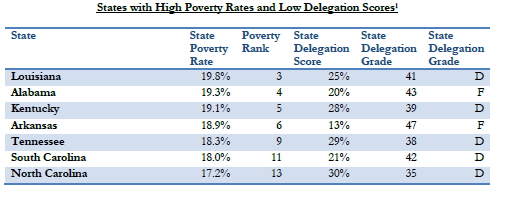If You’re Low-Income, America Is Still an Oligarchy
The U.S. isn’t an oligarchy after all.
At least that’s the argument in a recent article by Vox’s Dylan Matthews. Matthews cites new research finding that the rich and middle class agree on about 90 percent of bills that come before the United States Congress. He adds:
That leaves only 185 bills on which the rich and the middle class disagree……on these 185 bills [in which the rich and middle class disagree], the rich got their preferred outcome 53 percent of the time and the middle class got what they wanted 47 percent of the time. The difference between the two is not statistically significant.
Of course, that leaves out another group of Americans entirely: the poor. Admittedly, individuals cycle in and out of poverty so the notion of who is poor isn’t static. But that doesn’t change the fact that the poor are not only the least-represented group in American society, they’re also the contingent arguably most affected by federal policy decisions. So how do bills supported by low-income Americans fare? Not so well. The passage rate for bills favored only by low-income groups is 18.6 percent—slightly lower than those that lack support from all of the income groups. In fact, as the study’s authors conclude, “These results suggest that the rich and middle are effective at blocking policies that the poor want.”
What’s more, policies favored by the middle class and poor, who together comprise a majority of Americans, passed just 20.4 percent of the time, while those favored by only the rich passed 38.5 percent of the time. In other words, the rich had more success getting their policies enacted than the middle class and poor combined—which is the very definition of an oligarchy.
 Underscoring how little representation low-income Americans receive at the federal level, another recent report found that Members of Congress from states with higher poverty rates were also less likely to support measures that help their low-income constituents.
Underscoring how little representation low-income Americans receive at the federal level, another recent report found that Members of Congress from states with higher poverty rates were also less likely to support measures that help their low-income constituents.
Each year, the Shriver Center ranks Members of Congress from every state based on how they vote on a series of anti-poverty measures, ranging from the Child Tax Credit to Medicaid. Given that these programs earn overwhelming support from low-income voters (and most income groups), the Shriver rankings also illustrate the responsiveness of elected leaders to the concerns of low-income people.
In most cases, the divisions fall along party lines. In California, for example, every Democrat received either an A or A+, while every Republican received either a D or F. But party identification wasn’t the only predictor of a Member’s voting record. States like Louisiana, Alabama, Kentucky, and Arkansas all have poverty rates above 19 percent—some of the highest in the nation. Yet each of these states has a state delegation grade of D or F. In Mississippi, the state with the highest poverty rate in the country (21.5 percent), Senators Thad Cochran and Roger Wicker both received F grades.
In contrast, Connecticut and Maryland—ranked 48th and 49th in poverty levels—received A grades for their state delegation. Massachusetts, the state with the best average voting record in the country, also has one of the lowest poverty rates.
 Of course, correlation isn’t causation. The fact that states with higher poverty levels also have records that fail to reflect the preferences of many low-income voters doesn’t mean a higher poverty rate leads to undemocratic voting records. More likely, the two share some root causes. Many of the states with the highest poverty rates are located in the Deep South, a region that has historically been hostile to worker organizing and political participation by low-income people in addition to its legacy of slavery and Jim Crow.
Of course, correlation isn’t causation. The fact that states with higher poverty levels also have records that fail to reflect the preferences of many low-income voters doesn’t mean a higher poverty rate leads to undemocratic voting records. More likely, the two share some root causes. Many of the states with the highest poverty rates are located in the Deep South, a region that has historically been hostile to worker organizing and political participation by low-income people in addition to its legacy of slavery and Jim Crow.
But the report sheds some critical light on the paradoxical relationship between families who live in poverty and the politicians charged with representing them. And it suggests that for the most vulnerable Americans, the U.S. is far from democratic.
https://talkpoverty.org/2016/05/13/youre-low-income-america-still-oligarchy/



0 Comments:
Post a Comment
Subscribe to Post Comments [Atom]
<< Home